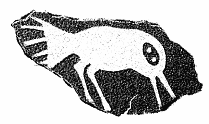Supplement
Tawquahdah-Mawks[en7] and her Canal (Thin Leather) Supplement
Tawquahdah-Mawks[7] and her Canal (Thin Leather)

And after this [killing of the Witch, the next story in Smith-Allison's sequence] the people had long peace, increased in numbers, and were scattered all around. Some lived where the old vahahkkees [great-houses] now are in the Gila [River] country, and some in the Papago country [desert south of the Gila], and some in the Salt River country [north of the Gila until the two rivers join slightly west of today's Phoenix]. And those who lived where the mound now is between Phoenix and Tempe [probably at Pueblo Grande Ruin] were the first to use a canal to irrigate their land. They raised all kinds of vegetables and had fine crops. And the people of the Gila country and the people of the Salt River country at first did not raise many vegetables, because they did not irrigate, and they used to visit the people who did irrigate and eat with them; but after a while the people who lived on
the south side of the Salt River also made a canal, and you can see it to this day.
But when those people tried their canal it did not work. When they dammed the river the water did not run, because the canal was uphill. And they could not make it deeper, because it was all in lime rock. They sent for Ee-ee-toy [Drink-it-all-up, alternative name for Siuuhu] to help them. And Ee-ee-toy had them get stakes of ironwood and sharpen them and all stand in a row with their stakes in their hands at the bottom of the canal. Then Ee-ee-toy sang a song, and at the end of the song the people were all to strike their stakes into the bottom of the canal to make it deeper. But it would not work, it was too hard, and Ee-ee-toy gave it up.
Ee-ee-toy said, "I can do no more, but there is an old woman named Taw-quah-dahm-awks (which means Wampum Eater), and she, though only a woman, is very wise and likely to help you better than I. I advise you to send for her."
The people sent for her and she said, "I will come at once." She came as she had promised, but she didn't go where the people were assembled but went right to the canal. And she had brought a fog with her, and she left the fog at the river, near the mouth of the canal. She went up the course of the canal looking this way and that to see how much uphill it ran.
When she reached where the canal ran uphill, she blew through it the breath which is called seev-hur-whirl ,[h] which means a bitter wind. This wind tore up the bed of the canal, as deep as was necessary, throwing dirt and rocks out on each side. Then the fog dammed up the river, and the water ran through the canal.
The old woman did not go near the people but went home, and in the morning when one of the people went to see why the old woman did not come, he saw the canal full of water and he yelled for everybody to come and see it. In this way the people got water for their crops and were prosperous as the others below [downstream from][8] them.
[h] Siw Hewel , 'Bitter Wind'. This wind is an important character in a version of the Feather Braided Chief and the Gambler myth, discussed later.